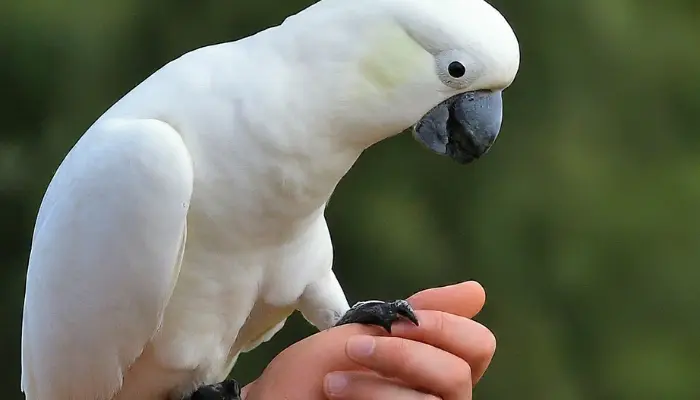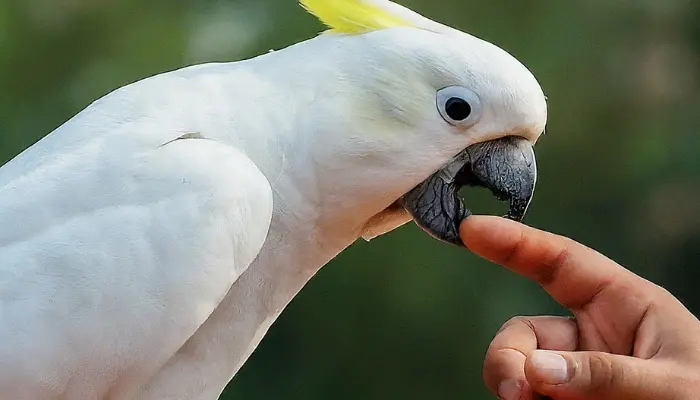No, cockatoos cannot bite your finger off because the bite strength of cockatoos is 350 PSI which is good enough to crack the nuts and toys. It is a bit force for completely biting off a finger. No matter if cockatoos cannot bite your finger off but their bites are still painful. Cockatoos can be trained to stop biting. But before training a cockatoo, you need to know why cockatoos bites.
Why do Cockatoos Bite?
Cockatoos like many other parrots might bite for various reasons.
- Communication: In the wild, parrots use their beaks to communicate with their flock members, establish dominance, or defend their territory. When in captivity, they might exhibit similar behaviors, such as biting to communicate their discomfort or to establish boundaries.
- Fear or Stress: Cockatoos might resort to biting when they feel threatened or stressed. Changes in their environment, such as moving to a new home or encountering unfamiliar people or animals, can trigger fear responses leading to biting.
- Attention-Seeking: Sometimes, cockatoos may resort to biting to get attention from their owners. Negative attention, such as scolding or reacting strongly to the biting, can inadvertently reinforce this behavior.
- Territoriality: Cockatoos can be territorial creatures, especially around their cages or favorite perches. Biting may occur if they perceive someone or something encroaching on their territory.
- Discomfort or Pain: Cockatoos may bite if they’re experiencing discomfort or pain, such as from an injury, illness, or hormonal changes.
- Mating Behavior: In some cases, biting can be related to hormonal behaviors associated with mating. This is more common in sexually mature birds.
Understanding the reason behind the biting behavior is essential in addressing it effectively. Positive reinforcement, patience, and providing a stimulating and comfortable environment can help minimize biting tendencies in cockatoos. Additionally, consulting with an avian behaviorist or veterinarian can offer valuable insights and guidance in managing biting behavior.

3 Types of Cockatoos Bytes
Cockatoos, like many parrots, can have various types of bites, depending on their mood and the situation. Here are three common types.
- Exploratory Bites: Cockatoos are naturally curious birds, and they often use their beaks to explore their surroundings. An exploratory bite may be gentle and inquisitive, as the bird investigates an object or a person. It’s often not meant to cause harm but rather to gather information about the environment.
- Defensive Bites: Cockatoos can become defensive when they feel threatened or scared. In such situations, they may bite as a way to protect themselves or their territory. Defensive bites can be more forceful and may cause injury if the bird feels particularly threatened.
- Territorial Bites: Cockatoos are known for their strong bonds with their human caregivers, but they can also be territorial creatures. They may bite to assert dominance or to defend their perceived territory, which could include their cage or even a favorite perch. Territorial bites are often a warning sign that the bird is feeling possessive and may escalate if the perceived threat persists.
Understanding the context and body language of the cockatoo can help in interpreting the type of bite and addressing the underlying cause, whether it is curiosity, fear, or territorial behavior.
Understanding and Preventing Cockatoo Bites
Cockatoos can indeed deliver a powerful bite, so preventing bites is important for both your safety and the well-being of the bird. Here are some tips.
- Understanding Behavior: Learn to read your cockatoo’s body language. Often, they give warning signs before biting such as pinning their eyes, raising their crest, or fluffing their feathers. Understanding these cues can help you avoid situations where a bite is likely.
- Positive Reinforcement: Use positive reinforcement techniques to encourage good behavior. Reward your cockatoo with treats or praise when they behave well, rather than focusing on punishing bad behavior.
- Proper Handling: Handle your cockatoo gently and respectfully. Avoid sudden movements or actions that might startle them, as this can lead to a defensive response like biting.
- Socialization: Socialize your cockatoo from a young age to help them become accustomed to different people and situations. A well-socialized bird is less likely to feel threatened and resort to biting.
- Respect Boundaries: Respect your cockatoo’s boundaries and give them space when needed. Pay attention to signs of discomfort and avoid pushing them into situations where they might feel the need to defend themselves.
- Training: Consider training your cockatoo using positive reinforcement techniques. Teach them commands like “step up” to help them understand what is expected of them in different situations.
- Provide Enrichment: Cockatoos are intelligent birds that need mental stimulation to stay happy and healthy. Provide plenty of toys, puzzles, and activities to keep them occupied and prevent boredom, which can sometimes lead to aggressive behavior.
- Regular Veterinary Check-ups: Ensure your cockatoo receives regular check-ups from a qualified avian veterinarian. Health issues can sometimes manifest as aggression, so it’s essential to rule out any underlying medical causes.
- Avoid Punishment: Avoid using punishment or physical force to discipline your cockatoo. This can damage the trust between you and your bird and may actually increase the likelihood of aggression.
- Consult a Professional: If you’re struggling to prevent biting behavior, consider seeking advice from a professional animal behaviorist or avian trainer who can provide personalized guidance and support.
Conclusion
cockatoos can deliver painful bites but they can’t sever fingers. Understanding why they bite like for communication or fear is key. Owners can prevent biting with positive reinforcement, proper handling, and socialization. Consulting avian experts can help too. Respecting their needs ensures a happy relationship and safety for both bird and owner.
